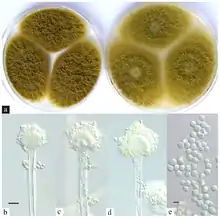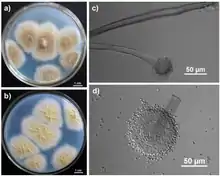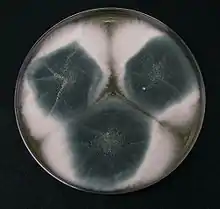Czapek medium
Czapek medium, also called Czapek's agar (CZA)[1][2] or Czapek-Dox medium, is a growth medium for propagating fungi and other organisms in a laboratory. It was named after its inventors, Czech botanist Friedrich Johann Franz Czapek (May 16, 1868 – July 31, 1921) and American chemist Arthur Wayland Dox (September 19, 1882 – 1954). It was developed to grow Aspergillus niger[3] and Penicillium camemberti.[4] It works well for many saprophytic fungi and soil bacteria[5] such as species of Aspergillus, Candida, Penicillium, and Paecilomyces.[6]


Friedrich Czapek's original recipe is as follows:[3]
- 1000 g distilled water
- 30 g cane sugar – energy source and sole source of carbon[5]
- 1 g dipotassium phosphate – buffering agent[5]
- 0.5 g magnesium sulfate – source of cations[5]
- 0.5 g potassium chloride – source of essential ions[5]
- 0.01 g iron sulfate – source of cations[5]

Arthur Wayland Dox added 2 g of sodium nitrate in his version, to provide a sole source of nitrogen that is inorganic.[4] This makes the medium a selective growth medium as only organisms that can use inorganic nitrogen can grow.[6] Czapek and Dox did not add agar but many recipes add 15 g to make a solid medium.[5][6]
References
- "Czapek Agar (CZA) Recipe". theLabRat.com. theLabRat.com. 2005. Archived from the original on 16 March 2015. Retrieved 7 November 2017.
Czapek Agar (CZA) Recipe
- "NRRL Medium No. 8 Czapek's Solution Agar ( CZA )" (PDF). ARS (NRRL) Culture Collection. Peoria, IL: ARS Culture Collection National Center for Agricultural Utilization Research. Archived (PDF) from the original on 27 December 2016. Retrieved 7 November 2017.
Czapek’s Solution Agar ( CZA )
- Czapek, F (1901–1902). "Untersuchungen über die Stickstoffgewinnung und Eiweifsbildung der Pflanzen" [Studies on nitrogen production and protein formation of plants] (PDF). Beiträge zur chemischen Physiologie und Pathologie (in German). 1 (12): 538–560. OCLC 1519369. Archived from the original on 28 March 2018. Retrieved 2 October 2017.
- Dox, Arthur Wayland (1910). "The intracellular enzyms of penicillium and aspergillus: with special reference to those of Penicillium camemberti" (PDF). Bulletin (United States Bureau of Animal Industry). 120: 37. OCLC 22281943. Archived from the original on 6 October 2022. Retrieved 3 October 2017.
- "CZAPEK MEDIUM" (PDF). Thermo Fisher Scientific. Lenexa, KS: Remel. September 20, 2007. Archived (PDF) from the original on 17 November 2017. Retrieved 3 October 2017.
- "CZAPEK-DOX AGAR". Hardy Diagnostics Instructions for Use. Santa Maria, CA: Hardy Diagnostics. Archived from the original on 8 July 2017. Retrieved 3 October 2017.
External links